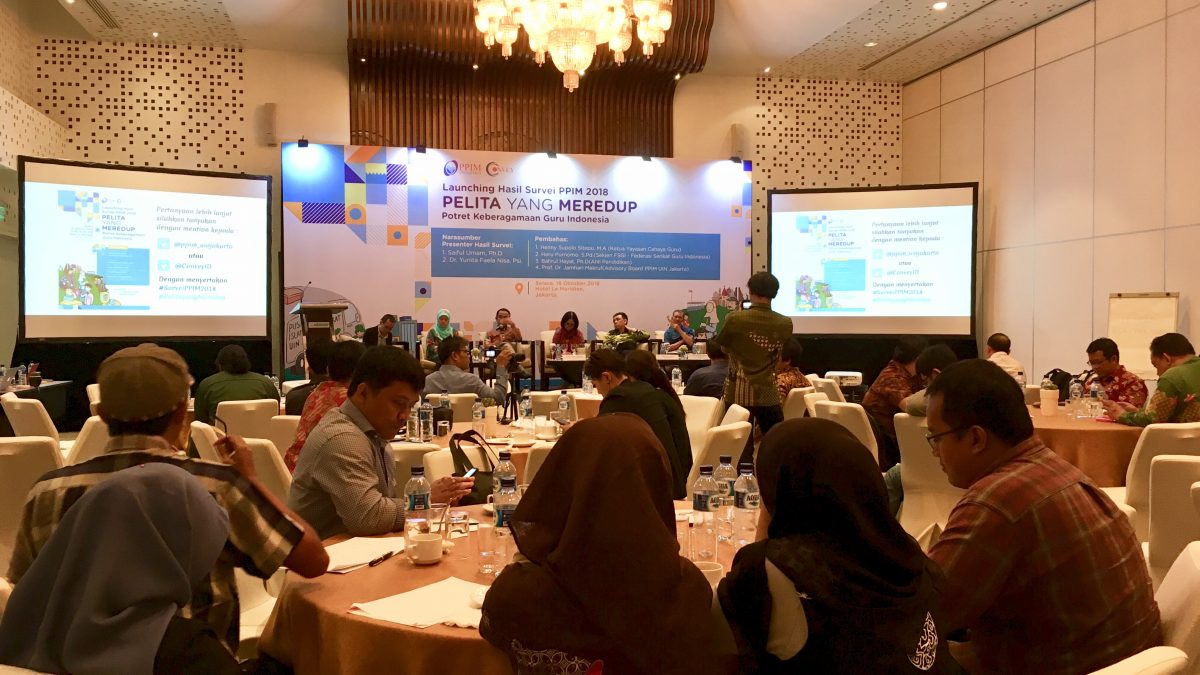Survey: Teachers Contribute to Students’ Radical Attitudes

PPIM Survey: Indonesian Teachers Believe in Islam the Solution to All Problems
October 18, 2018
PPIM 2018 Survey: Uncovering Teacher Intolerance and Radicalism
October 19, 2018REPUBLIKA.CO.ID – The Center for Islamic and Community Studies (PPIM) UIN Syarif Hidayatullah Jakarta 2018 again launched the results of a survey entitled The Dim Pelita: A Portrait of the Religious Teachers of Indonesia.
This survey is a continuation of the previous survey, the fire in the husk which shows that teachers have a significant role in influencing the level of intolerance of students.
The national survey coordinator, Dr. Yunita Faela Nisa Psi, explained that the motivation for this survey was due to the rampant tendency of intolerance and religious radicalism.
Another phenomenon said Yunita, also follows up on the attitude of students who do not only discuss religious issues with religious teachers but also teachers of other subjects.
“This does not only happen to middle school students but also occurs at the earliest education levels,” said Yunita when delivering the results of the 2018 PPIM survey in Jakarta, Tuesday (16/10).
Yunita explained, the sample involved in this study were 2,237 Muslim teachers from 767 urban districts throughout Indonesia who were randomly selected.
The concepts used are, first, religious intolerance or unwillingness to invite followers of other religions to express different ideas or interests.
Second, radicalization refers to the adoption of views of extremist groups to influence changes in social or political views, as well as using money to reject democratic principles.
“Finally, an Islamist view that refers to an absolute Islamic view that tends to be closed and exclusive,” continued Yunita
UGM Senior Researcher who also contributed to the survey, Saiful Umam PhD., explained that this quantitative method research using the Implicit Association Test (IAT) and questionnaire measures emphasized the issue of religious tolerance in Indonesia, starting from religious freedom, to relationships between different religious groups. This research said Saiful, also explores perceptions about Islamism or the relationship between religion and the state.
“This research shows that 63.07 percent of teachers have intolerant opinions towards followers of other religions,” said Saiful.
Not only opinion, he said, this survey also tracks the intentions of intolerant acts of Muslim teachers throughout Indonesia. Where it is found that although the opinion of intolerance is quite high, the desire to take action is still quite small.
In addition to measuring the opinions and actions of intolerance of Muslim teachers, the PPIM UIN Jakarta survey team also examined factors that are related to the emergence of teacher intolerance and radicalism.
Among other things, the Islamist view refers to an Islamist-radical understanding that makes Islamic law the main reference in all aspects of life.
“An example of the survey results states that 82.77 percent of teachers agree that Islam is the only solution to all society’s problems,” said Saiful.
In addition, the review from the demographic aspect is also quite surprising, where female teachers have more radical and intolerant opinions and action intentions than male teachers.
In addition, madrasah teachers are also declared to be more intolerant than general school teachers. Not only that, but private school teachers have also proven to be more intolerant than teachers in public schools.
“Low-income teachers (under one million rupiahs), and young teachers (usually teaching kindergarten / RA) also have higher radical opinion and action intentions,” continued Saiful.
Saiful reminded that many things were passed down from teachers being swallowed whole by students without being studied first so that they were embedded until they were adults.
“With that in mind, it is necessary to have an encounter between people with different backgrounds and religions to build diversity,” added Saiful.




